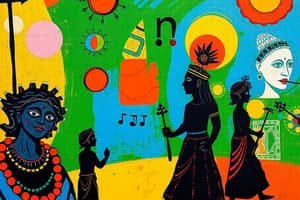Podcast
Questions and Answers
Which Mughal Emperor built the Taj Mahal in the 17th century?
Which Mughal Emperor built the Taj Mahal in the 17th century?
- Shah Jahan (correct)
- Humayun
- Babur
- Akbar
Which traditional dance-drama from Kerala tells stories from Hindu mythology?
Which traditional dance-drama from Kerala tells stories from Hindu mythology?
- Kathakali (correct)
- Thumri
- Bharatanatyam
- Madhubani
What is the name of the ancient city that is a hub of spiritual pilgrimage and a center of learning since ancient times?
What is the name of the ancient city that is a hub of spiritual pilgrimage and a center of learning since ancient times?
- Ellora
- Ajanta
- Varanasi (correct)
- Mithila
What is the name of the traditional art form from the Mithila region that uses natural dyes and intricate designs?
What is the name of the traditional art form from the Mithila region that uses natural dyes and intricate designs?
Which of the following spiritual practices did NOT originate in India?
Which of the following spiritual practices did NOT originate in India?
What was a distinctive feature of the Indus Valley Civilization?
What was a distinctive feature of the Indus Valley Civilization?
What is a reflection of India's cultural diversity?
What is a reflection of India's cultural diversity?
What can be attributed to the Vedic Civilization?
What can be attributed to the Vedic Civilization?
What is a notable aspect of India's spiritual practices?
What is a notable aspect of India's spiritual practices?
What does India offer in terms of historical sites?
What does India offer in terms of historical sites?
Flashcards are hidden until you start studying
Study Notes
India's Heritage
India, with its vast history, rich cultural diversity, and spiritual practices, offers a unique perspective into the evolution of human civilization. From ancient civilizations to traditional art forms, spiritual practices, mythology, and historical sites, India's heritage is a testament to the country's complex history and its enduring influence on the world.
Ancient Civilizations
India's heritage can be traced back to the Indus Valley Civilization, one of the world's earliest urban civilizations. This civilization, which existed from around 2600 BCE to 1900 BCE, was marked by advanced urban planning, trade networks, and a complex social structure. Another prominent ancient civilization was the Vedic Civilization, which emerged around 1500 BCE and laid the foundations for Hinduism.
Cultural Diversity
India is a land of diverse cultures, with over 15 official languages, over 300 minor languages, and some 3,000 dialects. The country is home to various social groupings, known as castes, and numerous sub-categories. India's religious landscape is also diverse, with Hindus, Muslims, Christians, Sikhs, and followers of other religions coexisting. Ethnic differences also abound, with a mosaic of communities that have deep spiritual and physical meanings.
Historical Sites
India is home to numerous historical sites that showcase its rich history. These include the Taj Mahal, a symbol of love built by Mughal Emperor Shah Jahan in the 17th century; the ancient city of Varanasi, a hub of spiritual pilgrimage and a center of learning since ancient times; and the rock-cut temples of Ajanta and Ellora, UNESCO World Heritage sites that date back to the 2nd century BCE.
Traditional Art Forms
India's heritage is also reflected in its traditional art forms, such as Kathakali, a classical dance-drama from Kerala that tells stories from Hindu mythology; Bharatanatyam, a classical dance form from Tamil Nadu that expresses Hindu mythological themes; and Madhubani painting, a traditional art form from the Mithila region that uses natural dyes and intricate designs.
Spiritual Practices
India's spiritual practices have shaped its heritage and continue to influence millions of people around the world. Hinduism, Buddhism, Jainism, and Sikhism all originated in India and have spread globally. These religions emphasize the quest for spiritual enlightenment, the pursuit of inner peace, and the importance of living in harmony with others.
Mythology
Indian mythology is an integral part of the country's heritage, with its rich collection of stories and characters that have been passed down through generations. These myths often revolve around gods and goddesses, heroes, and epic battles, and provide a window into the cultural values and beliefs of the people.
Art
India's art heritage is diverse and encompasses various mediums, such as painting, sculpture, and architecture. Indian art is known for its intricate details, vibrant colors, and rich symbolism, reflecting the country's cultural diversity and spiritual practices.
History
India's history is a tapestry of varied cultures, empires, and invasions that have shaped the country's present-day identity. From the ancient Indus Valley Civilization to the British colonial rule and the struggle for independence, India's history is marked by its resilience and adaptability.
In conclusion, understanding India's heritage requires an exploration of its ancient civilizations, cultural diversity, historical sites, traditional art forms, spiritual practices, mythology, art, and history. These aspects of India's rich tapestry have contributed to the country's enduring influence on the world and continue to shape its cultural identity today.
Studying That Suits You
Use AI to generate personalized quizzes and flashcards to suit your learning preferences.




